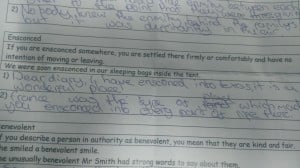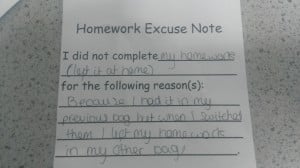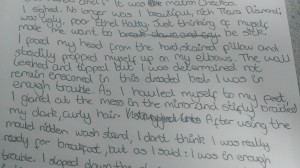Teaching is really hard. One of the problems is that there are so many things to do and not really enough time to do everything in the way that we want. I have struggled to keep on top of all of my work and still retain anything like a fair work-life balance. From my experience, there are certain things which we may let slide – not because we are bad teachers but because we are human beings who can’t spend every waking hour on the job.
The main reason homework has slid for me in the past is that I didn’t value it. It always felt like a waste of time as it didn’t seem to impact positively on my students’ progress. It is often the first thing to drop off the to-do list when I am busy and tired and working flat out. Whereas I would feel a deep sense of shame from not marking a set of exercise books, I can’t say I have ever been that bothered about forgetting homework. Homework can be time consuming to create, inconvenient to hand out, a nuisance to collect and a pain to mark! Hattie gives homework an effect size of 0.29 which seems to back up the idea that homework is ineffective.
Why does it matter?
Homework matters to a lot of people. It is often a high priority for senior leadership teams and I have had many conversations with parents who cite homework as their number one concern. Ofsted state that ‘setting appropriate homework’ is a feature of outstanding teaching. These are obviously important factors but they are not compelling enough for me and have never led to me setting effective homework because they don’t really tell me why. To be clear, I am not dismissing any of these factors as unimportant, but for me to sustain any changes in the habits of my teaching, I need to see exactly what’s in it for my students.
For me to make any sort of progress with my homework, it needs to be worth it. I have taken some time to read Hattie on homework again and it is interesting to read the nuances of his meta-analysis. Hattie talks about the greater benefits of homework the older students get, which makes the overall effect size somewhat skewed. For older students, the effect size is 0.64, making this above Hattie’s own hinge point of 0.4. Hattie adds that ‘more task-oriented homework had higher effects than did deep learning and problem solving homework.’ and ‘…the effects are highest, whatever the subject, when homework involves rote learning, practice, or rehearsal of the subject matter.’ I also find that this post by @headguruteacher makes a compelling case for homework. (He also has a detailed post on Hattie and homework here)
This goes some way to convince me that homework at Secondary could be effective and that if it involves rehearsal or practice it might be more worthwhile. From this I thought about the type of practice that would be effective for my students. Feedback based homework would be worthwhile, but I’m not sure that this meets my own selective criteria of homework being easy to prepare.
I decided that a vocabulary focus would be a strong driver for improvement. Because I have read around the subject and because I value it highly, vocabulary homework is not something I will do half-heartedly so is more likely to ‘stick’. While the jury may still be out on the overall effectiveness of homework, I am now in a position where I feel that the homework I set is helpful for my students while avoiding the problems I have struggled with in the past.
My approach
This is my current approach to homework. I trialled it with a couple of classes last year, have refined it and am now using it routinely. I am constantly reflecting on the benefits and as you will see below it is far from perfect but I am seeing the highly visible impact in the form of students’ work.
First, I choose words for study. I look at the texts we will be reading and choose words which I envisage having to explain. These could be words with multiple meanings, complex words, words students can’t work out from etymological or context clues. Words are also chosen if they give students precise vocabulary to write on the topic we are studying. For example, this list of vocabulary to help with a Blood Brothers essay. Here is an example of a word chosen from Animal Farm:
At one end of the big barn, on a sort of raised platform, Major was already ensconced on his bed of straw, under a lantern which hung from a beam.
I use the COBUILD dictionary and British National Corpus to create helpful definitions and example sentences.
The students write their own example sentences as homework.
The idea here is that students will take on these words if they are exposed to them several times. Many of the words chosen are ones they may be slightly familiar with and this additional encounter makes the even more ‘known’. You can see from the example below that the student is almost there but doesn’t quite have the precise meaning of ensconced. 
 I have started using Laura McInerny’s homework excuse notes to help manage the handing in of homework and the minimising of non-doers.
I have started using Laura McInerny’s homework excuse notes to help manage the handing in of homework and the minimising of non-doers.
Then, some time after students have completed the homework, we use them in class, usually through reading them in the book/poem/article. The idea is that a further interaction with them will allow these words to transfer into students’ written vocabulary. I spend longer on the words that students struggled with in the homework.
Then, I hope, students will use them unprompted in their writing as in the example below. Although the spelling isn’t correct, it is clear that this student has reached for the right word and found ‘ensconced’. Or, the student deliberately found a way to use their new word. Either way, that student now has that word firmly in their written vocabulary.
You can read more about vocabulary and why it is so important in the posts below:

